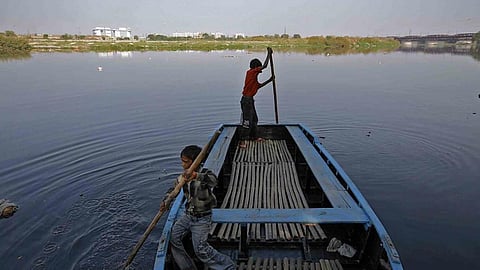
- Topics
- Feature
- Opportunities & Events
- About
- Hindi Portal
- Data
- Topics
- Feature
- Opportunities & Events
- About
- Hindi Portal
- Data

NGT panel raises concern about two project proposals that could affect Yamuna floodplains
The panel appointed the orders of the National Green Tribunal to monitor projects concerning Yamuna river revival has raised concerns about two project proposals that could affect the floodplains of the river in the capital.
One of the proposals that the committee considered was a project of the Public Works Department (PWD) to construct an elevated road along the riverbank from Wazirabad to DND. The project is found to be against the ecology of the river and will sharply reduce the expanse of floodplains.
The other project that the committee raised issues about was Delhi Transco Limited’s proposal for a 1.3-km-long extension of a 220 kV power transmission line, along with seven towers, to feed a proposed substation at Rajghat. Ecologist professor C R Babu, an expert member of the committee, noted that the alignment would be too close to the river and could provide resistance to floodwaters. (The Indian Express)
State-level drip irrigation programme launched in Haryana
With an aim to conserve water in the state, the Haryana government has launched a state level flagship programme on drip irrigation method. Under this scheme 1,445 villages with a water table below 100 feet depth have been identified for implementation of the scheme and drip irrigation system.
Owing to the low availability of canal water and increasing dependency on groundwater, the state has been grappling with a groundwater crisis. The situation has been critical in 85 blocks of 19 districts in Haryana.
Along with this, the farmers in the state are encouraged to grow crops that consume less amount of water and to adopt drip irrigation method. Also, state policies are being reoriented to utilise treated wastewater. (The Indian Express)
Amidst widespread protest, Punjab government scraps Mattewara project
To save the water resources and trees of Mattewara forest, the Punjab government has announced that no industrial unit will be set up near the forest. The decision came following widespread protests against the green nod to set up a textile park in the Mattewara forest in Ludhiana.
After the announcement, the state government further promised to not allow any other industry on the riverbanks of Punjab in order to prevent water pollution and maintain the ecological balance of the area.
The state government has, however, agreed to allot any new land to the proposed textile park with the condition that it doesn’t pollute the river waters. (The Times of India)
Mahanadi riverbed: NGT panel carries out inspection to protect river ecology
To ensure enforcement of applicable rules to prevent irreversible damage to the river's floodplain and associated ecological issues, the seven-member expert committee appointed by the National Green Tribunal conducted the inspection. The team reviewed nearly three-kilometre stretch of the river upstream of Jobra Barrage which has been reclaimed by sand filling. The team will next submit its recommendations for protecting the floodplain zone and the environment to NGT.
The inspection is conducted following a petition filed against the administration for violating the NGT norms and Orissa High Court order. It alleged that 424 acre of riverbed was reclaimed by filling sand causing hindrance to free flow of the river.
(The New Indian Express)
Karnataka’s port-led model neglects coastal communities
Aiming to attract a number of private investments, Karnataka is on a port-development spree. The three districts – Uttara Kannada, Udupi, and Dakshin Kannada – in the state are dotted with 12 minor ports, and one major port, in different stages of development. However, this accelerating port-led development is ignoring the concerns of the coastal communites and thus attracting resistance from the latter.
The model is being considered as violating the human rights. Not only it is leading to loss of biodiversity on which fishermen depend for their livelihood, it is also resulting in loss of coastal commons used by fishers.
Three port projects at Kasarkod-Tonka in Honnavar, Karwar and Tadadi have already run into trouble because of resistance from coastal communities living in the vicinity of the proposed projects. (Mongabay India)
This is a roundup of important policy matters from June 26 – July 16, 2022. Also, read the news this fortnight.